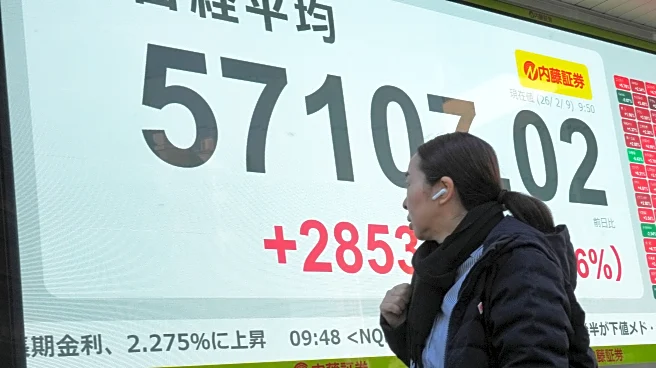What's Happening?
Electronic Arts (EA), a major player in the video game industry known for popular franchises like EA Sports FC and Madden, is set to be taken private in a significant all-cash deal valued at $55 billion. This transaction is backed by a consortium including Saudi Arabia's Public Investment Fund, Silver Lake Partners, and Affinity Partners, led by Jared Kushner. The deal is supported by $20 billion in debt financing from JPMorgan, with $18 billion expected to be funded at close. If finalized, this would be one of the largest private equity-funded buyouts in history, with the transaction expected to close in the first quarter of fiscal year 2027, pending regulatory and shareholder approvals. The buyout aims to leverage EA's intellectual property for potential media crossovers, although there are concerns about the high debt load and its implications for the company's future operations.
Why It's Important?
The privatization of Electronic Arts represents a significant shift in the video game industry, potentially impacting its strategic direction and operational dynamics. The involvement of Saudi Arabia's Public Investment Fund highlights the increasing influence of sovereign wealth funds in global business transactions. This move could lead to changes in EA's business model, focusing more on media crossovers and possibly altering its approach to game development and distribution. The high debt load associated with the buyout raises concerns about financial stability and future investment capacity, which could affect EA's ability to innovate and compete in a rapidly evolving market. Stakeholders, including employees, gamers, and investors, may experience shifts in company culture and product offerings as a result of this transaction.
What's Next?
The completion of the deal is contingent upon regulatory and shareholder approvals, which could introduce delays or modifications to the transaction. Industry observers will be watching closely to see how EA's new ownership structure influences its strategic priorities, particularly in terms of game development and potential media partnerships. The high debt load may necessitate cost-cutting measures or restructuring efforts, potentially impacting employee roles and company operations. Additionally, the broader video game industry may experience ripple effects, as competitors react to EA's privatization and adjust their strategies accordingly. The focus on media crossovers could lead to new collaborations and content offerings, reshaping the entertainment landscape.
Beyond the Headlines
The privatization of EA could have deeper implications for the video game industry, particularly in terms of ethical and cultural dimensions. The involvement of Saudi Arabia's Public Investment Fund may raise questions about the influence of foreign entities on American companies and the potential impact on content and corporate governance. Additionally, the shift towards media crossovers could blur the lines between gaming and other entertainment forms, influencing consumer expectations and industry standards. Long-term, this transaction may signal a trend towards consolidation and privatization in the gaming sector, affecting competition and innovation.












